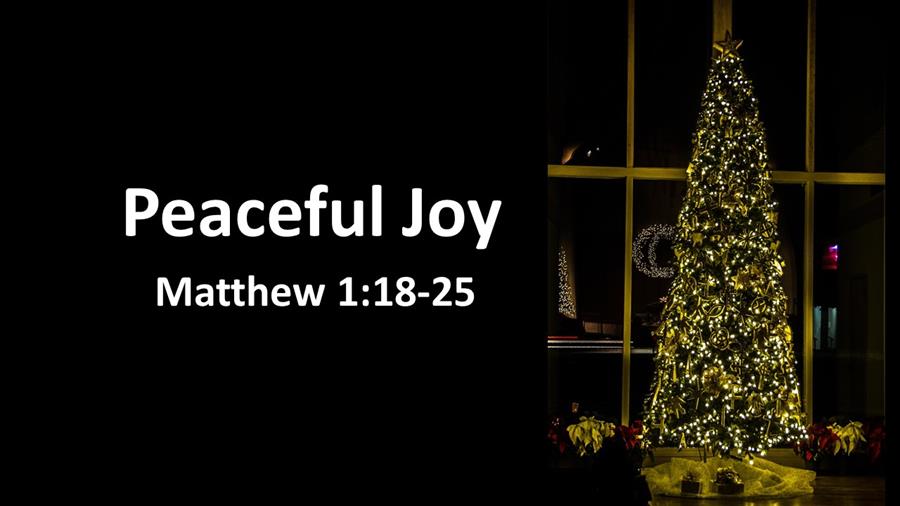
Jeff Garrison
Skidaway Island Presbyterian Church
Matthew 1:18-25
December 22, 2019
The Isaiah scripture is also referenced in Matthew’s telling of the birth narrative.[1] Before I read it, let me tell you a bit about the opening of Matthew’s gospel. The Gospel of Matthew is filled with surprises. It begins with a genealogy of Jesus. That seems innocent enough, but within the names, we find scandals. There are four women mentioned, none of who seem to meet the Jewish holiness standards. Two are foreigners, and there’s a prostitute, an adulterer and one involved with her father-in-law…[2] Matthew drives home the point that God works in mysterious ways and can use anyone to further the kingdom. Following the genealogy, we are told of Jesus’ birth and again, we find a scandal. A woman is pregnant and the man she’s to marry is not the father. Joseph, the man, is about ready throw in the towel, but then he has a dream. Let’s listen to the text. Read Matthew 1:18-25.
###
Christmas often doesn’t seem peaceful. Pressure can build as we strive to find the right gifts for our loved ones, or fix the perfect meal, or attend all the parties and concerts.
 The holiday stands in contrast to the birth of the Prince of Peace, as it was with a woman shopping in one of those big city department stores. It was a multi-floored building, with escalators and elevators and an entire floor devoted to toys. To her four and six-year-olds, it seemed like heaven. The mother was reminded of another place. Her kids kept singing the “I want this” song over and over. On every aisle they discovered a new “I gotta have” toy. Frazzled and about to come unglued, the lady finally paid for her purchases. She dragged the bags and her two kids to the elevator. The door opened. She and the kids and the presents squeezed in. When the door closed, she let out a sigh of relief and blurted, “Whoever started this whole Christmas thing should be found, strung up and shot!” From the back of the elevator, a calm quiet voice responded, “Don’t worry, madam, we already crucified him.”[3]
The holiday stands in contrast to the birth of the Prince of Peace, as it was with a woman shopping in one of those big city department stores. It was a multi-floored building, with escalators and elevators and an entire floor devoted to toys. To her four and six-year-olds, it seemed like heaven. The mother was reminded of another place. Her kids kept singing the “I want this” song over and over. On every aisle they discovered a new “I gotta have” toy. Frazzled and about to come unglued, the lady finally paid for her purchases. She dragged the bags and her two kids to the elevator. The door opened. She and the kids and the presents squeezed in. When the door closed, she let out a sigh of relief and blurted, “Whoever started this whole Christmas thing should be found, strung up and shot!” From the back of the elevator, a calm quiet voice responded, “Don’t worry, madam, we already crucified him.”[3]
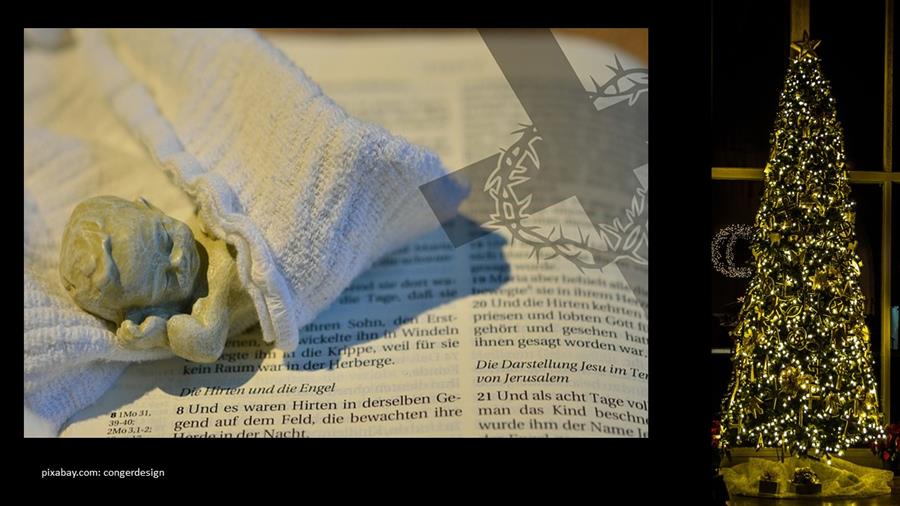
That joke reminds us that the Christmas story is all a part of a larger drama in which God is directing. Christmas is a celebration of the God coming to us in a way we can understand. It’s a new genesis (which we’ll discuss in a bit). In that child born of Mary, a peaceful joy is offered to the world. We can now experience forgiveness and to be reunited with God. Christmas, Good Friday and Easter are all linked together.

Birth is always an exciting time, for when a child is born there is no telling what might come from his or her life. But for this child, the child Mary carries, there’s something even more special about him. He’s the Messiah. But he’s not the Messiah folks are expecting. He’s not going to be a great military leader wiping out enemies. He’s not going to be a pretentious king sending decrees out from his throne in Jerusalem. He’s going to be a carpenter and a teacher and a healer. Instead of providing earthly rewards, he’ll erase the gap between us, citizens of earth, and God. He comes to save us from ourselves, from our sins, and from our failures at trying to be our own gods.

God certainly chose a unique way to bring the Messiah into the world. Our text begins simply: “the birth of Jesus took place in this way.” Interestingly, the word for birth used here literally means “the genesis.”[4] With Jesus, there comes a genesis, a new beginning. If you look at the opening chapter of John’s gospel, you’ll see John drawing upon the images of creation as recorded in the first chapter of Genesis; likewise, Matthew reminds us that this isn’t just an ordinary birth. God is starting anew.
This is a new beginning, a genesis. In Romans 5, Paul makes this analogy, comparing the works of Adam, who brought death into the world, with the works of Christ, who brings new life.[5] With Christ, our history with the Almighty, with our Creator, a history marred since Adam, starts over.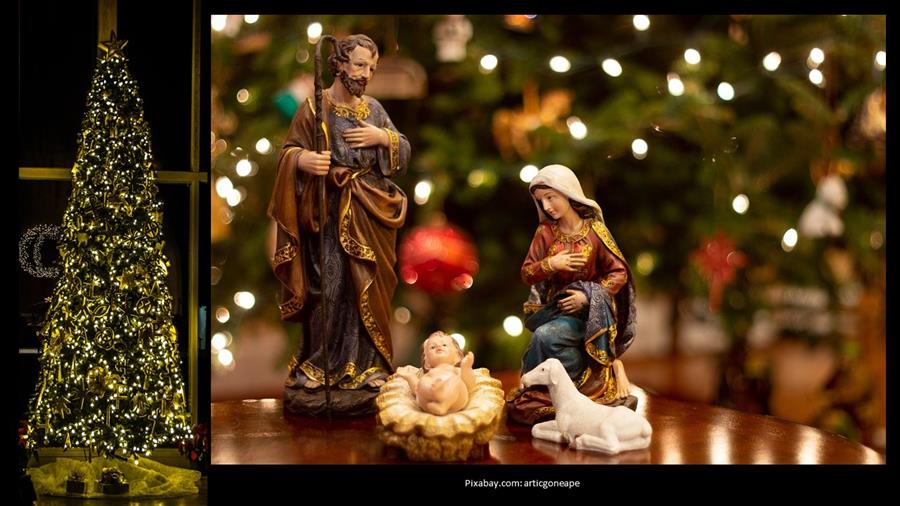
This new beginning starts with a young pregnant woman, not yet married. Her fiancé, we’re told, is a righteous man. It’s not easy to be an unwed mother today, but an unwed mother in the first century was in a real pickle. She didn’t have the social services we enjoy today to help such individuals and in a harsh religion that frowned on moral failure, such a woman had few options. She and her child would always be a social outcast. But Mary wasn’t just any woman with an out-of-wedlock pregnancy. She was carrying the Messiah… Her situation is precarious considering the pivotal role she plays in salvation history.
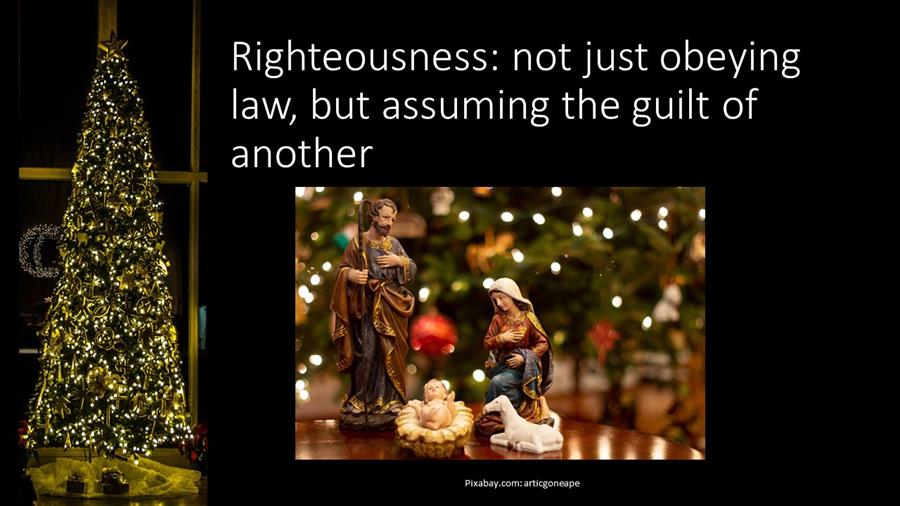
As we would expect, her fiancé is also shocked. We’re told he planned to quickly dismiss Mary which may sound harsh, but not in the culture of that era. He could have gone public and humiliated Mary and, at the same time, made himself look righteous. Because Joseph would have been wronged yet so righteous, his sad eyes would have drawn women. They’d be falling at his feet. But instead of boosting himself at Mary’s disgrace, he decides to quietly dismiss her. Joseph would now have to take the heat. It was an honorable thing to do, for he would protect Mary from crowds (for there would have been those willing to stone her) and he himself would accept her shame. From this story, we learn something about the true nature of righteousness. It’s not just doing what is right according to the laws or customs. It also means taking on, at the expense of oneself, the guilt of another. Christ does this for the world, and to a lesser degree, Joseph was willing to do this for Mary.
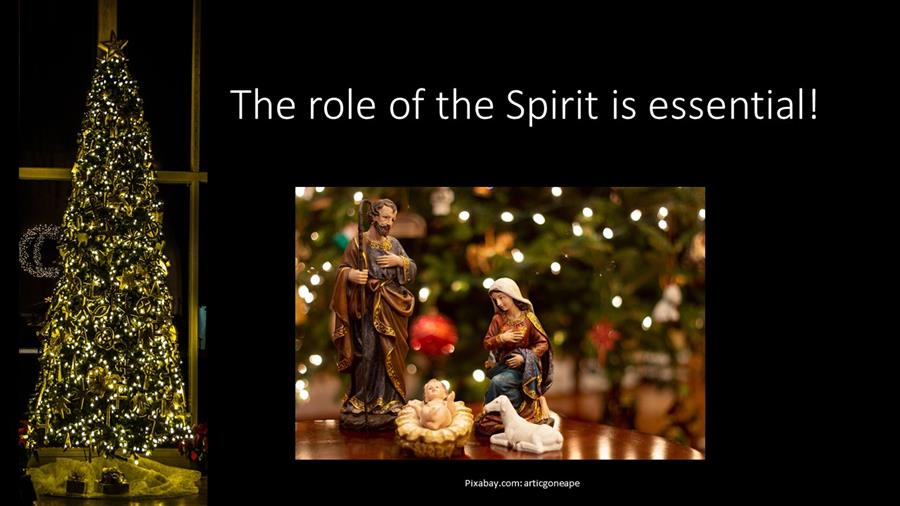 The glue that holds this passage together is the Holy Spirit. In a way, the Holy Spirit is like divine matchmaker. The Spirit impregnates Mary, bringing life into her womb and setting off this genesis, this new beginning. The Spirit also works on the other side of the equation, with Joseph, getting him to buy into the plan. Through the dream, Joseph is informed of Mary’s righteousness and of God’s plan for the child she carries. And when Joseph awakes, he decides not to dismiss Mary, but to go ahead with the wedding. They’ll marry and together raise this child and participate in God’s plan for reconciling himself to a fallen world. It’s a good thing Joseph listened to God in this dream.
The glue that holds this passage together is the Holy Spirit. In a way, the Holy Spirit is like divine matchmaker. The Spirit impregnates Mary, bringing life into her womb and setting off this genesis, this new beginning. The Spirit also works on the other side of the equation, with Joseph, getting him to buy into the plan. Through the dream, Joseph is informed of Mary’s righteousness and of God’s plan for the child she carries. And when Joseph awakes, he decides not to dismiss Mary, but to go ahead with the wedding. They’ll marry and together raise this child and participate in God’s plan for reconciling himself to a fallen world. It’s a good thing Joseph listened to God in this dream.
I’m may have told you before that when I was considering seminary, I had several dreams affirming my decision. I’m not sure I would have been as willing and ready to quit a job, sell a house, and move four states away had it not been for those dreams. In one, I found myself asking if it was worth it as I didn’t really think I was cut out for all this. But in this dream, I heard a very distinct voice saying, “Go ahead and go, and when you’re done, you’ll know what you’re to do.” Notice that I did not know where I was going or what it was that I’d be doing. I had to step out in faith, just as Joseph’s decision still required faith. But these dreams gave me the confidence I needed to pack up and head to seminary.
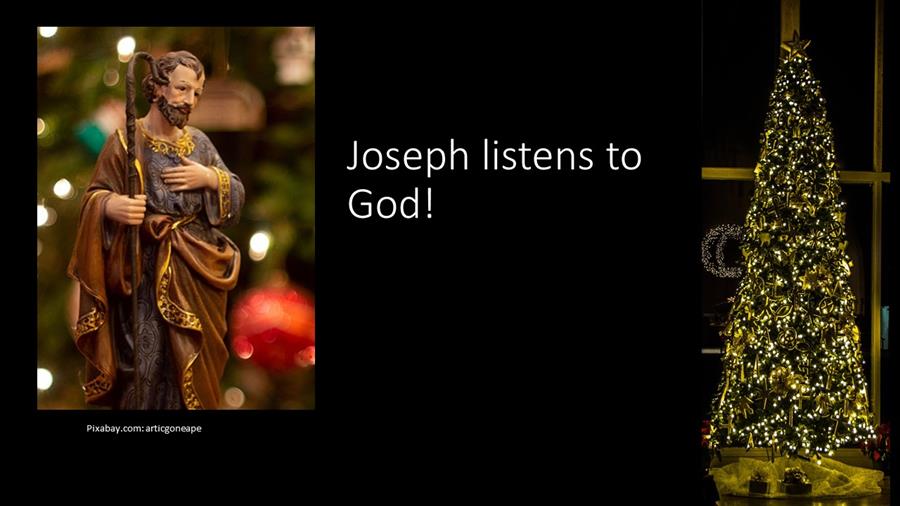 Joseph’s dream shows us the importance of listening to God and when we listen to God and follow his path, we will often find peace. Let me clarify. I don’t think listening to God means trying to understand all the dreams of our sleep. Often our dreams are a way that our minds sort out stuff. Instead of investing large amounts of time trying to understand what our dreams are telling us, we need prepare ourselves to hear God’s voice by studying Scripture, by praying and by being open to hear God by whatever means he comes to us. God’s word can come many ways: in our sleep, through a thought we have while walking or driving, or in a conversation. What’s important is that we know God’s word enough to make sure what we hear is from God. Notice in our account today how Joseph is reminded of the prophecies in Scripture. For him, that was assurance God was behind this.
Joseph’s dream shows us the importance of listening to God and when we listen to God and follow his path, we will often find peace. Let me clarify. I don’t think listening to God means trying to understand all the dreams of our sleep. Often our dreams are a way that our minds sort out stuff. Instead of investing large amounts of time trying to understand what our dreams are telling us, we need prepare ourselves to hear God’s voice by studying Scripture, by praying and by being open to hear God by whatever means he comes to us. God’s word can come many ways: in our sleep, through a thought we have while walking or driving, or in a conversation. What’s important is that we know God’s word enough to make sure what we hear is from God. Notice in our account today how Joseph is reminded of the prophecies in Scripture. For him, that was assurance God was behind this.
A second clarification needs to be made is about the meaning of peace. Obviously, if you read beyond the first chapter of Matthew, you’ll see that peace eludes Mary and Joseph as they flee as refugees to Egypt to escape Herod. The peace they had, in that little bundle of joy they protected, was knowing that they were fulfilling God’s will. God’s Spirit was with them, giving the strength they desperately needed. God’s peace doesn’t mean the absence of conflict, but the assurance of God’s presence. As the Psalmist reminds us, it’s the peace that overwhelms us even in the “shadows of death.”[6]
This passage is about the work of the Holy Spirit, guiding and directing mere mortals, like you and me, to help bring in God’s kingdom. Life is like that. It’s not about us; it’s about God. As for us, today, we, too, need to be open to experiencing that prod from God to take the risk before us. We need to be prodded to step out in faith. God’s Spirit gives us new life. In our prayers, in our Bible Study, in our mediation time, in times of quietness which may only come when we’re asleep, we need to be open to hearing God’s invitation to participate with him in bringing about the kingdom.
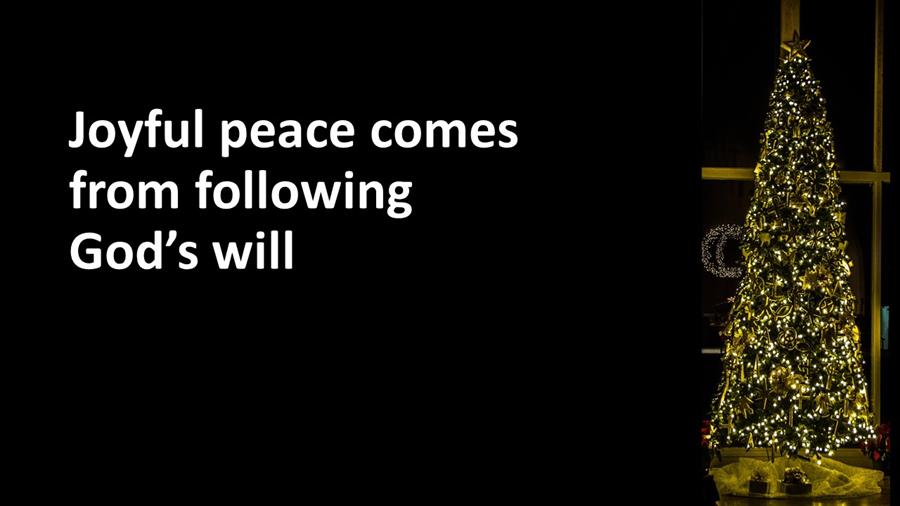
We learn in the first chapter of Matthew that God works through ordinary people. I have recently been reading John Kasich’s book, It’s Up to Us. He writes, “Leadership comes in all shapes and sizes, but it almost always starts at home and grows from there.”[7] Well, sometimes, it starts in a manger. And it starts when we respond to God’s call, for God can do great things through us, things that are frightening and things we would never have dreamed of doing on our own. When we hear God’s call and we answer, God will give us the peace to know that he’s with us and will guide us that we might do whatever small part we’re called to do to bring about the peaceful kingdom. Amen.
©2019
[1] Isaiah 7:13-15 was our Old Testament Reading
[2] Tamar (Genesis 38), Rahab (Joshua 2), Ruth (the Moabite with her own book) and Bathsheba (2 Samuel 11)
[3] I have told this story several times. I read the story and modified it from one used got the story years ago from a sermon by Dr Clayton Cobb, St Peter’s by the Sea Presbyterian Church, Rancho Palos Verdes, CA.
[4] Dale Brunner, The Christbook, Matthew 1-12 (Grand Rapids, Eerdmans, 2004), 23.
[5] Romans 5:12-21
[6] Psalm 23.
[7] John Kasich, It’s Up to US: Ten Little Ways We Can Bring About Big Change (Hanover Square Press, 2019), 108.

Great message Jeff. Merry Christmas to you and your family
Merry Christmas, my friend.
Great message!
Yes, indeed….God has his own ways to bring “peace” to human and even work to ordinary people…
Have peaceful Christmas
My friend, I have nominated you for a Sunshine Blogger Award: https://armchairsquid.blogspot.com/2019/12/sunshine-blogger-award.html. I have made important alterations to the “rules” for the award:
– You don’t have to display anything you don’t want to.
– You don’t have to pass on the award to others in order to accept it for yourself. You are thoroughly deserving without having to jump through any hoops.
– You also don’t have to answer my questions, though I hope you will. I am genuinely interested in your responses.
– Simply know that I am grateful for our blogosphere friendship.
Very interesting post 🙂 merry christmas
I hope you have a wonderful Christmas.